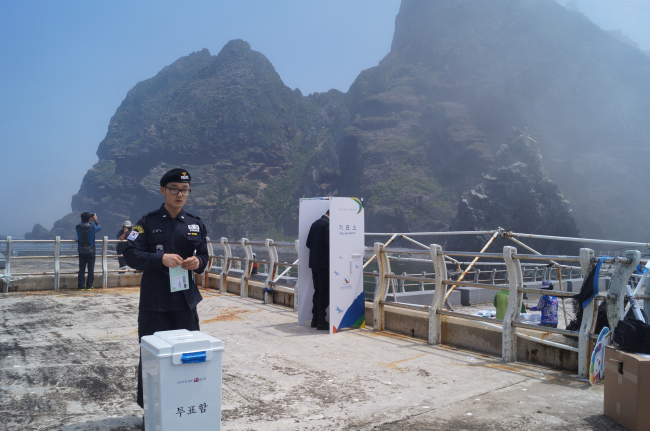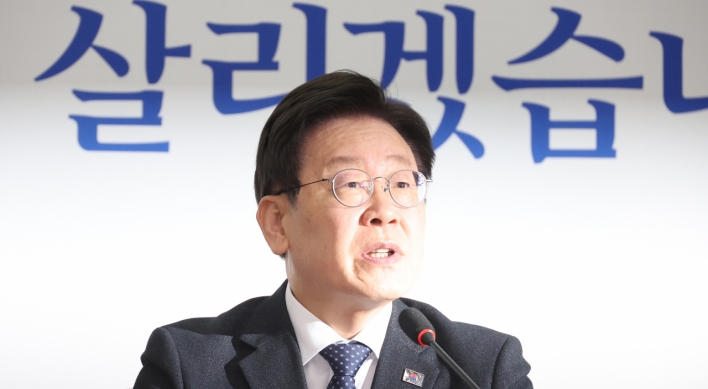Parties scramble for support ahead of local elections
By Korea HeraldPublished : June 1, 2014 - 20:54
Political parties are making last-minute efforts to attract voters to their causes in the crucial June 4 local elections, with a number of key seats being contested in neck-and-neck races.
For both the ruling Saenuri Party and the main opposition New Politics Alliance for Democracy, the results of the upcoming elections will have a strong impact.
The ruling party hopes to clinch victories in key regions to further strengthen its dominance, while such developments would shore up the NPAD’s claims of the government’s incompetence. The two parties, however, are in tight races in a number of key regions including Gyeonggi Province and Incheon. One notable exception is Seoul, where the NPAD’s Park Won-soon is considered to have a significant lead over rival Chung Mong-joon.
The NPAD’s leaders once again honed in on the Sewol ferry disaster, saying that the party would fight the “incompetence of the government and irresponsibility of the ruling party.”
For both the ruling Saenuri Party and the main opposition New Politics Alliance for Democracy, the results of the upcoming elections will have a strong impact.
The ruling party hopes to clinch victories in key regions to further strengthen its dominance, while such developments would shore up the NPAD’s claims of the government’s incompetence. The two parties, however, are in tight races in a number of key regions including Gyeonggi Province and Incheon. One notable exception is Seoul, where the NPAD’s Park Won-soon is considered to have a significant lead over rival Chung Mong-joon.
The NPAD’s leaders once again honed in on the Sewol ferry disaster, saying that the party would fight the “incompetence of the government and irresponsibility of the ruling party.”

“The elections are being held at the crossroads of a Korea that is completely different from that before the Sewol tragedy,” NPAD cochairman Rep. Kim Han-gil said Sunday.
“We need to defeat the incompetence of the government that failed to save even one life, and the irresponsible ruling party that hopes only to protect the president.”
Kim also said that the main opposition party would cooperate fully with the government and the ruling party in “overcoming a crisis” and suggested a meeting with the president to discuss “national innovation” after the elections.
As for cochairman Rep. Ahn Cheol-soo, the former presidential candidate revisited Gwangju to provide support for Yoon Jang-hyun.
Yoon, NPAD’s Gwangju mayoral candidate, is in an uphill battle against independent Kang Woo-tae, who left the party in protest of Yoon’s nomination. Although Gwangju is the main opposition’s powerbase, Yoon’s nomination has been badly received by the voters, placing Yoon at an unforeseen disadvantage.
The Saenuri Party is also facing the possibility of an unprecedented loss in one of its strongholds: Busan. The southern port city has traditionally been a bastion of conservatism, leaving only a slim chance for progressive candidates.
This year, however, independent candidate Oh Keo-don is giving Saenuri’s Suh Byung-soo a run for his money.
Oh is not affiliated with any party and yet considered to belong to the progressive bloc. Prior to forming the NPAD with the Democratic Party, Ahn reportedly attempted to bring Oh to his cause. In addition, Oh’s Busan campaign was bolstered by absorbing that of NPAD’s Kim Young-choon.
The ruling party, for its part, concentrated fire on the capital region, convening the election committee meeting in Incheon, where its candidate Yoo Jeong-bok is struggling against NPAD’s Song Young-gil.
As the parties scramble to garner support, the advance voting figures have come out, raising hopes that overall voter turnout for the local elections could break the 60 percent mark. With the exception of the first local elections held in 1995, the participation rate in local elections has remained below 60 percent.
On Friday and Saturday, a record number of voters took part in advance voting. Of the country’s 41.3 million or so voters, more than 4.7 million, or about 11.5 percent, cast their ballots, setting a new record for voter participation during the advance voting period.
By age group, those under 20 showed the highest participation with nearly 16 percent of the youngest voters taking part. They were followed by voters in their 60s and 50s, respectively.
Voters in their 30s showed the lowest participation at 9.41 percent.
By Choi He-suk (cheesuk@heraldcorp.com)
-
Articles by Korea Herald



![[Herald Interview] 'Amid aging population, Korea to invite more young professionals from overseas'](http://res.heraldm.com/phpwas/restmb_idxmake.php?idx=644&simg=/content/image/2024/04/24/20240424050844_0.jpg&u=20240424200058)






![[Hello India] Hyundai Motor vows to boost 'clean mobility' in India](http://res.heraldm.com/phpwas/restmb_idxmake.php?idx=644&simg=/content/image/2024/04/25/20240425050672_0.jpg&u=)







